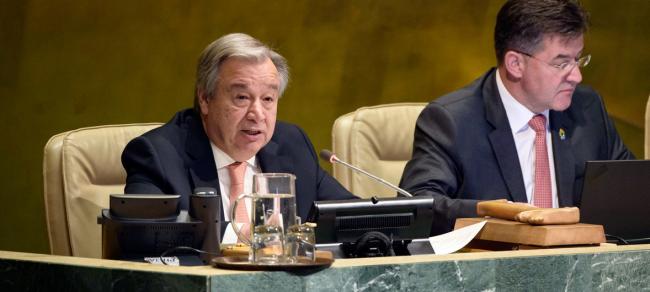
‘All atrocity crimes are preventable’ and can never be justified – UN chief
New York,June 26 (IBNS): Atrocity crimes – genocide, crimes against humanity, war crimes, and ethnic cleansing – are not “inevitable”, the United Nations Secretary-General said on Monday, stressing that the international community must do more to end violence against innocent people.
Speaking at a General Assembly debate on the ‘responsibility to protect’ on Monday, Secretary-General António Guterreshighlighted that upholding the obligation, when it is most needed, is critical.
“At this time of extreme challenges, we must not abandon the responsibility to protect or leave it in a state of suspended animation, finely articulated in words but breached time and again in practice,” he said.
“Lofty principles mean little if they cannot be applied when they matter most.”
The responsibility to protect, widely known as R2P, refers to the obligation of States toward their populations and toward all populations at risk of genocide and other mass war crimes.
After years of discussion in the wake of the atrocities committed Bosnia and Rwanda during the1990s, UN Member States committed to the principle by including R2P in the outcome document of the 2005 high-level UN World Summit in New York.
In addition, increasing the participation of civil society would help enhance early warning and ensure the effectiveness of national human rights institutions and ombudspersons, he added.Today, Guterres reminded Member States of their duty to protect their own people and proposed steps they could take to strengthen their capacities, including conducting national risk assessments and designing policies to address any vulnerabilities.
“Our over-arching challenge is to uphold the principle while preventing its mis-use,” said Mr. Guterres: “That means acting promptly, preventively, diplomatically, before situations escalate and spiral out of control.”
The Secretary-General also urged all Member States to “ratify and domesticate” instruments of international law relating to the prohibition and prevention of the atrocity crimes.
Of the 193 UN Member States, 45 are yet to ratify the Convention on the Prevention and Punishment of the Crime of Genocide, which was adopted in 1948 and entered into force in early 1951. The Convention defines genocide in legal terms and underlines the need to hold those responsible for the reprehensible act to justice.
Also addressing the meeting, General Assembly President Miroslav LajÄák recalled that in the years since the 2005 World Summit and the adoption by the Assembly of a resolution on the issue in 2009, today’s gathering was the body’s first formal meeting on the principle.
“So, I think it is a good time to remind ourselves of the weight on our shoulders,” he said.
The Assembly President also stressed that prevention lies the core of the responsibility to protect.
“[It means] to do everything we can to avoid reaching the point where humanity is lost,” he said, noting that while prevention may be “hard work; but it is worth it.”
He also highlighted the link between the responsibility to protect and the UN Charter.
“We have all committed, through the Charter’s first line, to save future generations from the scourge of war. And the responsibility to protect is based on this very objective,” he said.
Support Our Journalism
We cannot do without you.. your contribution supports unbiased journalism
IBNS is not driven by any ism- not wokeism, not racism, not skewed secularism, not hyper right-wing or left liberal ideals, nor by any hardline religious beliefs or hyper nationalism. We want to serve you good old objective news, as they are. We do not judge or preach. We let people decide for themselves. We only try to present factual and well-sourced news.







